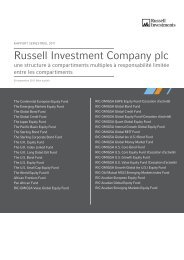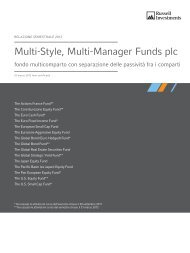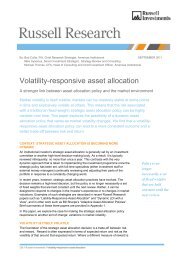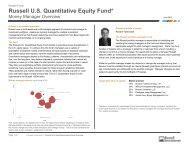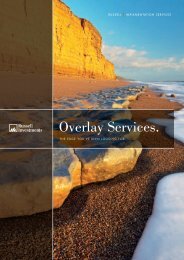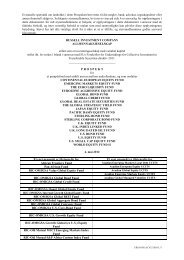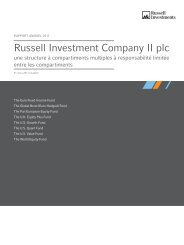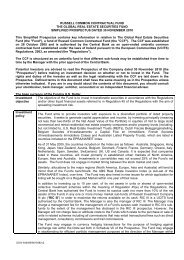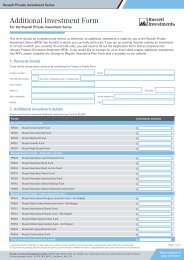Implementing LDI with swaptions - Russell Investments
Implementing LDI with swaptions - Russell Investments
Implementing LDI with swaptions - Russell Investments
Create successful ePaper yourself
Turn your PDF publications into a flip-book with our unique Google optimized e-Paper software.
STRATEGY TIMING IMPLEMENTATION<br />
RUSSELL INVESTMENTS<br />
OPINION<br />
Climate change and investments,<br />
or: “Why should I care?”<br />
By: Greg Liddell, Managing Director, Consulting & Advisory Services—Australasia<br />
Greg Liddell<br />
1<br />
Doran and Zimmerman,<br />
University of Illinois,<br />
Examining the Scientific<br />
Consensus on Climate<br />
Change, EOS Volume 90<br />
Number 3, 20 January<br />
2009.<br />
2<br />
US National Oceanic<br />
and Atmospheric<br />
Administration, National<br />
Climate Date Centre<br />
http://www.ncdc.noaa.<br />
gov/indicators/<br />
3<br />
Stern Review on the<br />
Economics of Climate<br />
Change 2006.<br />
Few issues have generated more skepticism than the subject of climate change. If 97% of the<br />
world’s astronomers told us a large meteor would collide <strong>with</strong> the Earth on December 22, 2012<br />
(the alleged last day of the Mayan calendar), we would not waste too much time arguing about<br />
the veracity of their models. Rather, we would focus on building a rocket to destroy the meteor,<br />
or at least to change its trajectory. However, when 97% of the world’s geoscientists 1 tell us that<br />
anthropogenic (the politically correct term for “man-made”) carbon emissions are resulting<br />
in 0.29ºF of global warming per decade, 2 <strong>with</strong> long-term but ultimately devastating impacts,<br />
the consequence is a degree of skepticism that has led to years of procrastination. In my view,<br />
fiduciaries do not have the luxury of procrastination.<br />
So why should fiduciaries squeeze climate change considerations into governance budgets which<br />
are already stretched? In my view, there are two answers to that question, one based on long-term<br />
sustainable values and one based on responsibilities in relation to the management of risk.<br />
Our current economy has a use-by date. Ultimately we will run out of fossil fuels and be forced to<br />
transition to renewable sources of energy. Studies tell us that the longer we postpone the transition,<br />
the more harm we will do to the planet, and the more costly and painful the transition will be. 3 Those<br />
who adopt a broader view of fiduciary responsibility would argue that as effective owners of the<br />
economy, fiduciaries should deploy capital not only to generate returns, but also to facilitate transition<br />
to a sustainable economy and in doing so, protect and maintain the society and way of life of members.<br />
On a shorter-term basis, fiduciaries should be aware of the risk to portfolios climate change poses.<br />
Agencies such as the EPA can introduce regulations materially changing the economics of some<br />
enterprises. State governments can introduce measures that effectively put a price on carbon,<br />
and foreign governments can introduce measures impacting companies operating <strong>with</strong>in their<br />
jurisdictions—for example, U.S. airlines flying into Europe will need to purchase carbon credits from<br />
January 2012. The physical risks associated <strong>with</strong> climate change should also not be ignored. Owners<br />
of physical assets need to incorporate stress testing for climate-change scenarios in their due diligence<br />
and ongoing management, or face potential losses and liability. Property must cope <strong>with</strong> rising<br />
seawater and more violent storms, motorways must cope <strong>with</strong> heavier rainfall. The insurance industry<br />
is already sending price signals in regard to climate change, increasing the price of insuring assets in<br />
high-risk areas and increasing the number of areas deemed “uninsurable.”<br />
An awareness of climate change does not mean fiduciaries should immediately invest large<br />
proportions of their assets in wind farms and solar energy initiatives. Most climate funds lack<br />
diversification and rely too heavily on government subsidies to generate returns. Climate change,<br />
like economic cycles, interest rates and national debt, is a factor. Thought should be given to the<br />
vulnerability of assets to either the financial or the physical risks associated <strong>with</strong> this factor, much<br />
as fiduciaries consider the impact of increased interest rates on bond portfolios, or of decreased<br />
consumer confidence on the stock prices of retail companies. The initial imperative for fiduciaries<br />
is to educate themselves on the issues.<br />
p / 11




